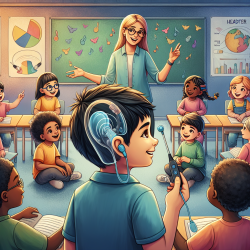Unilateral hearing loss (UHL) can significantly impact a child's ability to understand speech in noisy environments, participate in classroom activities, and maintain sustained auditory attention. The study, "The use of remote microphone systems in unilateral hearing loss: a preliminary study among Brazilian children and teenagers," provides compelling evidence supporting the use of RMS to mitigate these challenges.
Key Findings
- Speech Perception: The study found that children using RMS showed improved speech perception in various noisy environments. This was measured using the Hearing in Noise Test (HINT), where children exhibited better signal-to-noise ratios with RMS compared to just hearing aids (HA).
- Classroom Participation: The Classroom Participation Questionnaire (CPQ) revealed significant improvements in understanding teachers and peers, as well as increased positive affect and reduced negative affect, when RMS was used.
- Sustained Auditory Attention: The Sustained Auditory Attention Ability Test (SAAAT) indicated that children using RMS demonstrated better sustained auditory attention, reducing both inattention and impulsiveness errors.
Implementation in Clinical Practice
Based on these findings, practitioners should consider the following steps to integrate RMS into their therapeutic strategies for children with UHL:
- Assessment: Conduct comprehensive assessments using tools like HINT, CPQ, and SAAAT to establish a baseline for each child.
- RMS Fitting: Ensure proper fitting of RMS devices in conjunction with hearing aids. The study utilized the Naida III UP Phonak HA and verified device transparency using Audioscan Verifit® equipment.
- Teacher and Parent Training: Educate teachers and parents on the effective use and maintenance of RMS. This includes understanding the importance of regular use and periodic verification of the devices.
- Follow-Up: Schedule regular follow-ups to monitor progress and make necessary adjustments to the devices or therapeutic strategies.
Encouraging Further Research
While the study provides strong evidence supporting the use of RMS, it also highlights the need for further research. Practitioners are encouraged to contribute to this growing body of knowledge by conducting their own studies and sharing their findings.
To read the original research paper, please follow this link: The use of remote microphone systems in unilateral hearing loss: a preliminary study among Brazilian children and teenagers.










